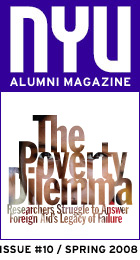politics
Buyer Beware
A new book considers how presidents use advertising strategies to sell war
by Robert Polner
Think of war as a breakfast cereal, a skin cream, or the iPhone. Far-fetched? Not really, say Terence P. Moran and Eugene Secunda in their comprehensive and timely new book, Selling War to America: From the Spanish American War to the Global War on Terror (Praeger Security International), in which they argue that a president’s case for military intervention often resembles the marketing of any product.From 1898, when William McKinley unleashed American sea power and imperial ambition upon the islands of the Caribbean and Philippines, to the present war in Iraq, U.S. government and military leaders have turned to the latest technologies and techniques of salesmanship. Many a White House has used branding, media management, and pop culture to ensure a patriotic response to their military adventures. McKinley transmitted his messages about the war-hungry penny press's "Splendid Little War" via a newfangled invention, the telegraph; Franklin Delano Roosevelt had his "fireside chats"; and George W. Bush declared premature victory on an aircraft carrier in front of a "Mission Accomplished" banner.
Though a president's propaganda may appear hollow in retrospect, it typically works in the moment, write the authors, both professors at the Steinhardt School of Culture, Education, and Human Development. Since the dawn of advertising and modern communications, Americans have shown that they would buy whatever war their president was selling. Moran, a retired U.S. Marine who still recruits for the corps, and Secunda, an Army veteran who was a senior executive at J. Walter Thompson advertising, felt compelled to tell this story because, Moran says, "[People] buy a war with less attention than they buy an automobile." We are, after all, they argue, "gunfighters" at heart—John Wayne's DNA strands seem woven deep into our cultural character. "[A]ny president selling a war has a customer base that is already half sold," they write. "A few well-chosen slogans and images will complete the deal."
Even the biggest skeptics have had trouble resisting the hard sell, say the authors, given the tools of persuasion in the hands of a president. Woodrow Wilson appointed George Creel, an investigative journalist, to head the Committee on Public Information, and Creel enlisted artists to create paintings, posters, popular songs, and sculptures to help make the case for the "Crusade for Democracy." His committee organized choirs, civic clubs, religious institutions, and recruited 75,000 volunteers to give four-minute speeches in 5,200 communities. Though the Allies won the war, the example of the danger of overselling a war's potential is evident in the failure of Wilson to achieve his sweeping "Fourteen Points" in the Versailles Treaty negotiations. The unmet objectives to spread democracy through the crumbling empires of old Europe led to more than two decades of public disillusionment and isolationism at home.
The successful rallying of American support for entry into the First World War nonetheless became a primer for the marketing of World War II, which, from a selling perspective, was the most successful American war of all time, say the authors. Initially Roosevelt had a lot of persuading to do to reverse public suspicion of U.S. military engagements abroad. He skillfully leveraged radio, however, bringing his reassuring, stoic attitude and faith in the cause of democracy and liberty to living-room listeners across America. Six months after the attack on Pearl Harbor, he created the Office of War Information, which influenced the tone and content of hundreds of Hollywood comedies, dramas, and musicals to boost civilian and military morale if not provide a few hours of escape from the realities of war. Patriotic songs filled the airwaves ("Praise the Lord and Pass the Ammunition") and even comic book heroes like Batman stepped up to enlist. Meanwhile, press censorship and government regulation curbed contradictory messages in the media.
The Korean War, say Moran and Secunda, was by contrast the forgotten war, despite the fact that it was the first major national event covered by all the U.S. television networks, reaching nearly 30 million Americans. Harry Truman downplayed its importance, not even calling it a war (it was a "police action") and waited more than three weeks after the North Koreans invaded South Korea to go to the American people about his decision to commit troops. Hollywood, too, took little notice.
Those years planted the seeds for Vietnam, a war the authors view as a marketing fiasco. The protracted conflict provoked the antipathies of the baby boomers, who denounced its underlying rationale and turned against it, as did much of the mainstream media. It was a war characterized by political manipulations and promises unfulfilled. Even the triggering event for the escalation of U.S. military actions proved flimsy—according to many historians, two alleged attacks by North Vietnamese torpedo boats in the Gulf of Tonkin were but invented provocations to win Congressional authorization. "The Vietnam War," they write, "was a textbook example of a war that was badly sold."
The war in Iraq, in contrast, is a "classic example of good marketing killing a weak product." While President Bush's persuasive arguments for toppling Hussein marshaled strong public support, his claims that the Iraqi strongman had weapons of mass destruction and something to do with the terror attacks of September 11, 2001, have not been borne out—nor have proclamations of quick success. "The question is whether Americans can act like the informed, enlightened, and thoughtful citizens necessary for any democracy to flourish, or will they continue to be willing buyers of whatever war an administration is selling," the authors write. "We hope that the former is true, but fear that the latter is more likely."
“People buy a war with less attention than they buy an automobile,” says Terence P. Moran.







